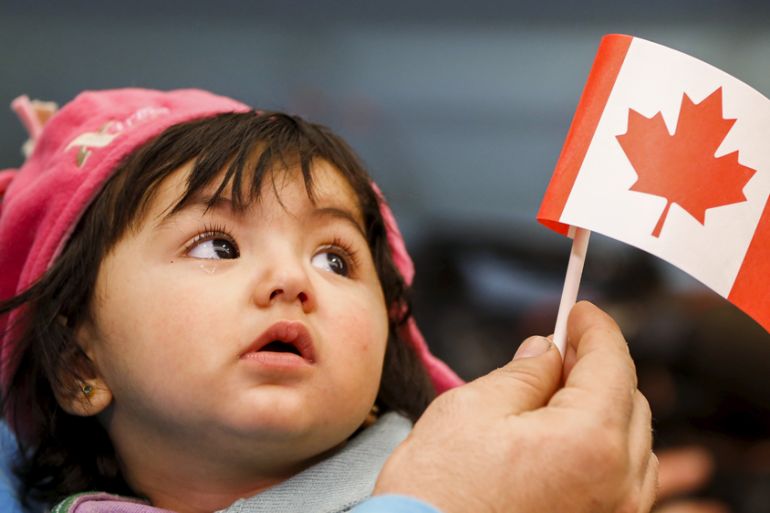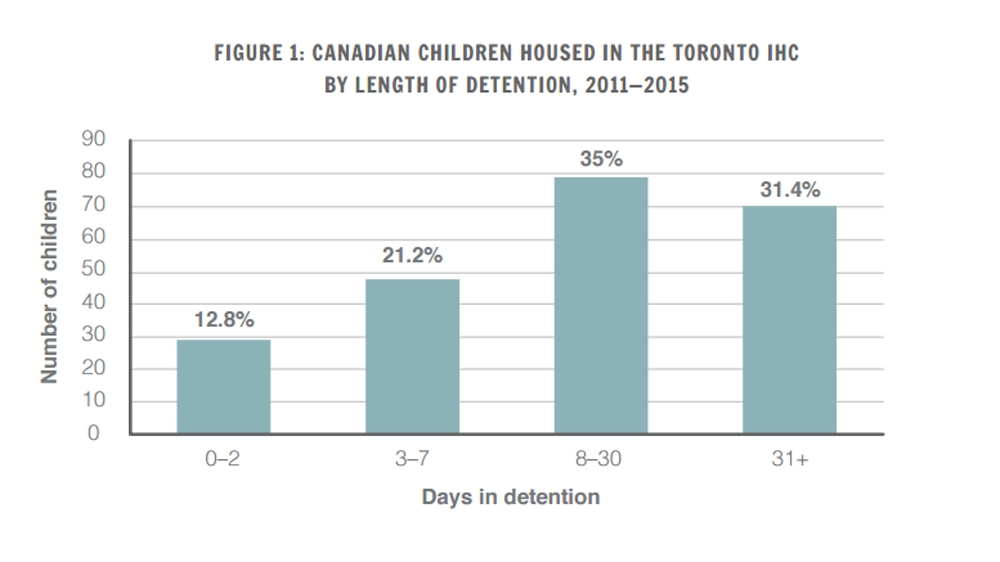Canada locking up hundreds of children each year
New report says children held alongside parents in immigration detention are at risk of ‘serious’ human rights abuses.

Hundreds of children are being held each year in immigration detention facilities, an experience that can lead to psychological harm and puts them at risk of “serious human rights violations”, a new report says.
An average of 48 Canadian children have been held annually as “guests” alongside their parents at the Toronto Immigration Holding Centre alone between 2011 and 2015, according to the report released on Thursday by the International Human Rights Program at the University of Toronto.
Keep reading
list of 4 items‘Mama we’re dying’: Only able to hear her kids in Gaza in their final days
Europe pledges to boost aid to Sudan on unwelcome war anniversary
Birth, death, escape: Three women’s struggle through Sudan’s war
Hundreds of non-Canadian children are also held annually in immigration detention facilities across Canada.
“Violating the human rights of some of the most vulnerable members of our society is a blemish on Canada’s reputation as a human rights defender,” the report said.
“Such practices are especially out of step with Canada’s renewed efforts to become a global leader as a multicultural safe haven for refugees and migrants.”
The report included testimonies from nine women from the Middle East, West Africa and Central America.
Canadian children are especially at risk, because while they cannot be legally subjected to detention under the country’s immigration system, they are allowed to stay with detained parents if it is determined to be in their best interests.
Mothers detained with their children, or forced to be separated from them, “expressed deep anguish about the detrimental consequences of the experience on their children’s health”, the report stated.
“Their children had difficulty sleeping, lost their appetite for food and interest in play, and developed symptoms of depression and separation anxiety, as well as a variety of physical symptoms.”

One woman, Naimah, was arrested in February 2015 and detained with her eight-year-old daughter, Aaliya, for more than a year.
The girl was “crying every day [saying] ‘Mommy, I want to go to school,’ because she loved to go to school”, Naimah said in the report.
‘I can’t give my baby to anyone’
Another mother, Mariame, described being arrested and detained with her five-month-old son, Oscar.
“My son was crying because they were searching me, and … he was hungry,” Mariame said. “I couldn’t attend to him, I couldn’t breastfeed him.”
When she told officials that detaining her was not in the best interests of her young child, she said she was told she could give him to someone to take care of while she was detained.
“But I can’t give my baby to anyone,” she said.
Foreign nationals and permanent residents in Canada can be held in immigration detention under Canada’s immigration laws, and the Canada Border Services Agency is responsible for detaining anyone under this system.
|
|
Border officials can hold anyone who they deem poses a risk to public safety, cannot prove their identity, or arrives in Canada without a visa.
Immigration officials say they detain children “only as a last resort”.
A child is allowed to stay with a parent in detention if it is determined to be in the child’s best interests.
‘Invisible’
While an average of 242 mainly non-Canadian children were held in this system each year between 2010 and 2014, children with Canadian citizenship are especially at risk because they fall outside the legal framework.
“Canadian children are invisible in Canada’s immigration detention system,” said Samer Muscati, director of the International Human Rights Program, in a statement.
“While all detention of children is horrible, these children are particularly vulnerable because they lack important legal safeguards, including their own detention review hearings,” Muscati said.
Last year, Canada earmarked $138m to transform the immigration detention system, including finding better alternatives to incarceration and investing in infrastructure.
“The government of Canada is committed to exercising its responsibility for detentions to the highest possible standards, with physical and mental health and wellbeing of detainees, as well as the safety and security of Canadians as the primary considerations,” Public Safety Minister Ralph Goodale said at the time.
According to the report, alternatives to detention should be explored and implemented.
These could include community-based, non-custodial programmes that would allow families to stay together in a healthier environment, while also ensuring that individuals meet their obligations to attend immigration proceedings.